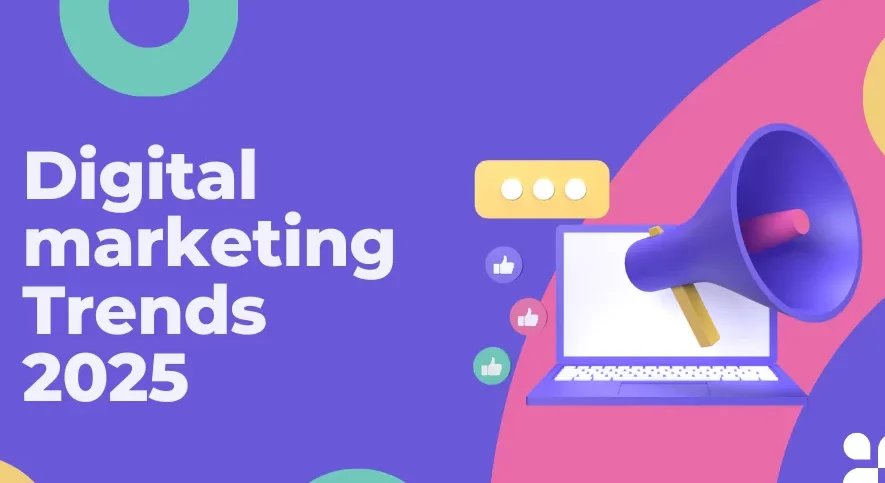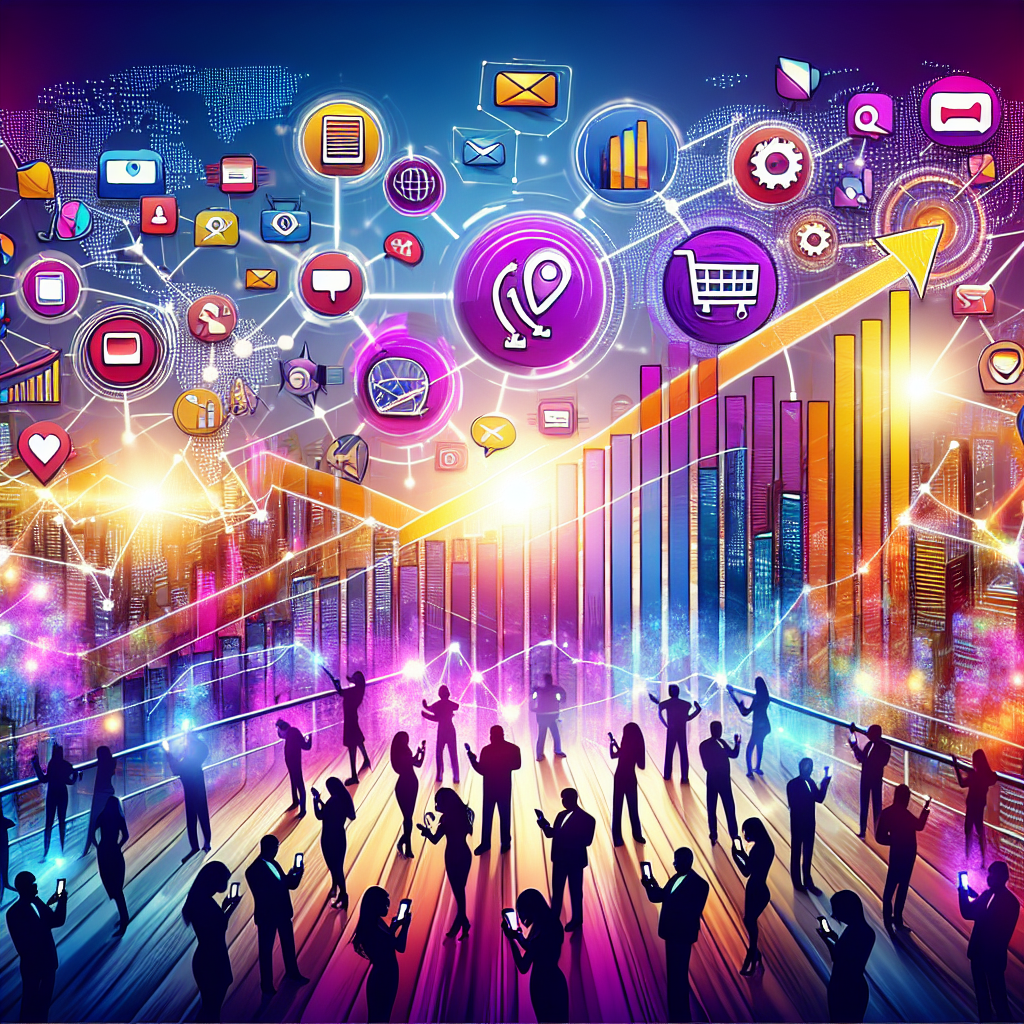CURRENT TRENDS IN DIGITAL MARKETING IN 2025

The digital world is changing fast, and 2025 looks to be a key year for marketing breakthroughs. Businesses are using advanced technology and adjusting to new consumer habits to stay competitive. Trends like artificial intelligence, machine learning, and personalized, immersive experiences are transforming how brands engage with their audiences. This year brings fresh strategies designed to boost engagement and deliver real results, shaping a smarter and more dynamic future for marketing. This blog shows the latest trends in digital marketing which is needed to thrive in the digital marketing world.
Top Trends in Digital Marketing for 2025
As 2025 approaches, digital marketing is changing faster than ever. Brands are using new tools and strategies to connect with audiences and build effective campaigns. Here are the top trends shaping digital marketing in 2025:
1. AI-Powered Personalization
Artificial Intelligence is now integral to digital marketing. By 2025, AI tools will prioritize hyper-personalization, offering tailored content, product suggestions, and unique experiences based on user behavior and data. Businesses leveraging AI personalization will see higher engagement and conversions.

2. Voice Search Optimization
Voice assistants like Alexa, Google Assistant, and Siri are becoming essential, making voice search optimization crucial. As consumers use voice commands more for queries and purchases, marketers must adapt SEO strategies to prioritize conversational keywords and natural language.
3. Interactive Content
Static content is losing relevance. In 2025, interactive content like quizzes, polls, AR experiences, and 360-degree videos will take over digital marketing. These formats grab attention, boost engagement, and strengthen brand-consumer connections. This is one of the major trends in digital marketing which is needed for increased visibility.
4. Sustainability and Purpose-Driven Marketing
Consumers are growing more aware of environmental and social issues. Brands that show their commitment to sustainability and a clear purpose will connect better with their audience. By 2025, marketing will focus more on ethical practices, transparency, and sharing stories about social responsibility.
5. Influencer Partnerships Evolve
Influencer marketing remains powerful, but the focus is shifting to micro and nano influencers. These smaller creators often foster stronger, more authentic connections with their audiences, making them ideal for niche marketing and trust-building.

6. Social Commerce Expansion
Social media platforms are becoming more integrated with shopping experiences. TikTok, Instagram, and Facebook have already introduced seamless purchasing capabilities, and by 2025, social commerce will be the norm. Brands will need to optimize their social media strategies to include shoppable content and leverage live-stream shopping events to drive sales.
7. Virtual and Augmented Reality
VR and AR technologies will transform customer experiences. Virtual showrooms, interactive demos, and immersive branding will become key tools for marketers to boost engagement. These innovations let customers “try before they buy,” easing the purchasing process.
8. Zero-Party Data Collection
With increasing concerns around privacy and the phasing out of third-party cookies, zero-party data will take center stage. This involves collecting data directly from consumers through surveys, preference settings, and interactive tools. Marketers will need to focus on building trust and encouraging voluntary data sharing.
9. Video Content Dominance
Video content keeps leading in engagement and shows no signs of slowing. Short videos, live streams, and storytelling will be key in 2025. Platforms like YouTube Shorts, TikTok, and Instagram Reels will stay essential for brand exposure.
10. Predictive Analytics
Data-driven decision-making is advancing with predictive analytics. Using historical data, marketers can forecast trends, understand behavior, and optimize campaigns effectively. This approach provides businesses a competitive advantage.
OTHER ADDITIONAL CURRENT TRENDS IN DIGITAL MARKETING
A Digital Marketing Course has never been more relevant, as the year 2025 sees the industry rewriting brand-new rules in this captivating field. AI has become the quiet strategist behind every campaign today, crafting content as if it knows your audience better than you do. Short-form videos now rule the stage, delivering impact on the brink of a second, while augmented reality turns browsing into an immersive adventure.
Interestingly, sustainability and climate control have taken centre stage, as customers demand more than just products—they want purpose!. According to aaft blog, these are also the digital marketing trends to watch Top 10 Digital Marketing Trends to Watch in 2025
1. Artificial Intelligence (AI) Integration
AI and Machine Learning (ML) are becoming hugely popular in transforming the Digital Marketing landscape. These technologies are now more sophisticated and user-accessible to:
- Precisely target the potential audience.
- Creating personalized content using tools like Jasper and ChatGPT allows businesses to tailor individual preference-based content.
- Automating routine tasks like email marketing and lead nurturing to centralize their team’s focus on strategic decision-making.
- Improving customer interactions through Chatbots and virtual assistants by providing more natural, human-like interactions using advanced features. Some of the features include Sentiment Analysis and Natural Language Processing (NLP).
2. Short-Form Video Content
Short-form video content on social media platforms like TikTok, YouTube Shorts, and Instagram Reels is becoming a central component of social media strategy. These videos are highly engaging and resonate well with digital-first generations. In addition, it also offers an impressive ROI for the company or influencers by leveraging this content form. Moreover, with their growing popularity, short-form videos may see significant growth, as over half of marketers plan to increase their social media platform investment in TikTok, Instagram Reels, and YouTube Shorts. This format is proving to be an effective way to retain and capture audience information.
3. User-Generated Content (UGC)
User-generated Content (EGC) is a valuable source for companies for their brand elevation and connecting with targeted audiences. It involves real stories and workplace content shared by employees, helping in building trust and transparency.
Moreover, platforms like LinkedIn are ideal for EGC, especially with its rapid rise in the last few years. As of 2025, LinkedIn has over one billion worldwide members, with a significant portion actively engaging on the platform. Sharing EGC on LinkedIn not only increases brand visibility but also helps businesses achieve their goals by showcasing authentic employee experiences.
4. Personalization and Customer Experience
Personalization is about user experience, which is achieved by tailoring products and services to individual preferences. In addition, AI-driven recommendations and AR features help customers make better purchase decisions, leading to higher business sales.
However, while most marketers agree on the relevance of personalization, many feel their brands aren’t doing enough to offer a truly personalized experience for their customers. This shows that personalization is still in a developing stage in terms of the Digital Marketing trend. Humans are hardwired to respond to stories. Incorporating storytelling into your content can make it more relatable and memorable. Share personal anecdotes, customer success stories, or narratives that illustrate the value of your product or service. A compelling story not only grabs attention but also builds an emotional connection with your audience. Creating Engaging Content That Resonates with Audiences – Easylifeways
5. Voice Search Optimization
Voice search and voice commerce are becoming more popular, thanks to Alexa, Google Home, and Siri—the trending smart speakers. Many people now use voice commands to search for information and do online shopping.
Voice search’s benefits are a more conversational type (unlike traditional searches), where users can easily ask questions like “What are the best coffee shops near me?” instead of traditional keyword typing (a time-consuming process). To reach this audience, brands must leverage their SEO strategies with natural languages and long-tail keywords.
6. Augmented Reality (AR) Experiences
AR and VR are no longer just for gaming; they are now driving the dynamic retail industry by offering immersive shopping experiences. For example, IKEA’s AR app lets users see furniture in their space, and Sephora’s AR tool allows virtual try-ons on makeup.Businesses today can use AR and VR to engage customers better and stand out in the market. Fashion brands can offer virtual try-ons, while real estate companies can virtually create property tours. Adopting these technologies early can make brands competitive, enabling them to meet rising customer expectations.
7. Sustainability and Social Responsibility
The widespread impact of climate change has increased consumer demand for sustainable products. Today, many users are willing to pay the price for premium, responsibly produced or sourced items. This shift reflects growing environmental awareness and the need for ethical business practices.
Consequently, in 2025, brands must prioritize sustainability not only for satisfying consumer expectations but also to comply with new EU regulations that require transparency in sustainability reporting.
8. Data Privacy and Compliance
“Data privacy policy changes” are reshaping how marketers gather audience insights, which is a critical skill after completing a Digital Marketing Course Near Me. As Apple and Google, among other major platforms, have phased out third-party cookies, businesses are shifting towards first-party data collection, where they can gather information from customers directly.
This change challenges marketers to adapt their targeting strategies while ensuring privacy compliance regulations. Furthermore, it underscores the balancing of the importance of personalization with ethical data practices to maintain Digital Marketing trust and effectiveness.
9. Customer-Centric Marketing
A marketing strategy shift is adamant as brands now shift away from relying solely on renowned influencers to collaborate directly with their loyal customers. By taking a community-first approach, companies are actively creating authentic, customer-generated content that can be featured in ads or on social media, fostering deeper engagement and trust.
This trend is expected to show a steep rise in 2025, with brands like REFY setting an example by hosting exclusive events for their most dedicated community members. These efforts not only build stronger connections but also position the brand as stylish, aspirational, and customer-focused leaders in their industry.
Read Also: The Impact of Technology on Education in Classrooms
10. Case studies
Case studies are a key content marketing strategy component, especially in B2B marketing, by building brand recognition and effective lead generation. These success stories provide real-world examples of how a brand delivers value, making them a powerful tool for attracting potential customers.
In 2025, case studies will remain a popular choice, with many marketing teams already using them and most marketers planning to maintain or increase their investment. This shows their ongoing effectiveness in driving trust and engagement with target audiences
CURRENT TRENDS IN DIGITAL MARKETING; CONCLUSION
Digital marketing in 2025 will focus on innovation, personalization, and building strong connections. Brands that keep up with these trends can create effective campaigns and foster loyal audiences. As technology evolves, marketers who stay flexible and open to change will succeed in this fast-paced field.



